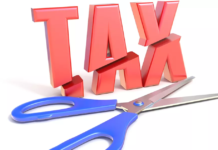My last post about Conservative standards and principles garnered a comment regarding income taxes. This post is an answer to that, to completely state my views on personal income taxes.
As inevitable and inescapable as death, taxes are an integral part of what we bring home vs what we earn, what we earn on investments, and what we pay for what we buy. Since 1913, with the ratification of the 16th Amendment to the US Constitution, personal Income Taxes have been a constant as a funding mechanism for Federal government. A few Federal programs (FICA and Medicare) are funded by separate payroll taxes. In addition, business income taxes on net profits, as well as short- and long-term capital gains taxes on the sale of investments, are Federal funding vehicles. Sales and property taxes, along with State Income Taxes, are generally methods to pay for local, county, and State government. This post will focus on Federal personal income taxes. I’ll save business income taxes for another time. Let’s dig.
There is no question that the Federal government needs funding. TONS of questions remain on HOW TO SPEND that money, and what priorities should be, and that is the topic of a separate post. This post is about the income side, and how best to fund whatever programs are deemed necessary. And imposing a personal tax on wages and incomes has allowed for an exponential growth in government, which many (including this author) view as a poor concept–we must find ways to spend those new revenues, right? Yeah.
A point to consider: it is an Economic axiom that if you want less of something, tax it; if you want more of something, subsidize it. As taxes increase the cost to the buyer, and subsidies decrease the cost to the buyer, that axiom makes total sense. So, a fun question: does taxing wages and interest income discourage those activities? Back in the 1960s, when the marginal high-end tax rates were in the 70%+ range, dodging taxes via ‘write-offs’ was a common practice—almost no one paid that high marginal rate. Even in the current, relatively lower marginal rates environment, some folks will forgo work to retain income-ceiling-based benefits. Why earn additional wages, if it means losing a housing allowance? Individuals will do what is perceived to be in their own best interests, and they will modify their behavior to maximize their resources. Expecting anything less is foolhardy. There is no legal or moral justification to paying anything more than the very least amount of legal income taxes possible (this is not an invitation to cheat or create fictional ‘deductions’).
Back in its inception, Federal Income Taxes were levied in any real size only on the very wealthy. The TOP END tax rate was 7%, and that only applied to incomes over $500,000! The overwhelming majority of income earners paid between 1-3%. These rates remained unchanged from 1913 to 1915. The first changes were implemented in 1916, and we have never looked back. Our system is considered ‘Progressive’, in that the marginal tax rates increase for higher incomes. In our current state, for many folks, Federal Income Taxes are their largest expense yearly—more than housing (#2), transportation (#3), insurance (#4), or food and clothing.
Another point: the personal tax code now is a behavior modifier, not just a governmental income generator. Some folks buy houses, rather than rent, specifically due to tax treatment of mortgage interest. Why it should be a tax difference for married vs single, zero children vs several, charity spending vs non, green energy usage vs traditional, etc. is beyond me. Taxing savings interest as regular income certainly discourages saving. Tax fairness may be the ultimate oxymoron. That the top 1% of incomes pay roughly 65% of all personal income taxes collected, while the bottom 47% of income earners have zero net tax liability lays waste to that whole ‘fairness’ thing.
Best-selling books have been written regarding replacing Federal Income Tax with a National Sales Tax. Google ‘Fair Tax’. There are obvious benefits to such a sales tax: the tax collection mechanism is already in place; personal income would no longer be tracked at all (I dig the privacy of that); personal yearly tax filing would disappear; the IRS could focus on sales tax collection only; illicit income currently untaxed or hidden would be taxed upon usage; and so on. Want to decrease taxes paid? Buy less stuff (see the above Economic axiom). Maybe exclude food and medicine from sales tax? That would certainly be worth a look. For this method to work effectively, it MUST be accompanied by a full repeal of the 16th Amendment. If you guess that I don’t trust our government to ADD a consumption tax IN ADDITION TO existing income taxes, you’d be quite correct. And protections would have to be in place to prevent Congress from raising the new sales tax rate to untenable levels. It should be as difficult to raise that rate as it is to Amend the Constitution, as raising that rate impacts virtually EVERY US citizen.
Another point: an argument can be made (and I’ve made it) that signing your current income tax return violates your 4th Amendment (without probable cause of a crime, you’re allowing a ‘search’ of your financial household) and 5th Amendment rights (you are testifying accuracy of the return against yourself).
I am in favor of a consumption tax replacing the existing income tax as a method to fund Federal government. It’d be nice to turn April 15th of every year into just another Spring day, rather than a pressure-packed filing deadline.
























